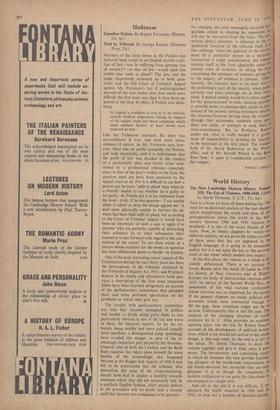Unfitness
Guenther Podola. By Rupert Furneaux. (Stevens, 18s. 6d.) NEITHER of the main issues in the Podola case had ever been raised in an English murder trial: that of fact—was he suffering from genuine loss of memory?—or that of law—would such loss render him 'unfit to plead'? The jury and the judge respectively answered no to both ques- tions; and the full Court of Criminal Appeal agreed. Mr. Furneaux's fair if undistinguished account of the case makes clear how much more difficult the first issue was than it may have ap- peared at the time. In effect, if Podola was sham- ming,
he feigned a condition so rare as to be virtually outside medical experience, faking in support of his unique claim just those symptoms which some eminent doctors at least would have expected to find.
Like the Tichborne claimant, his story was extraordinary if true, and even more extra- ordinary if untrue. As Mr. Furneaux says, how- ever, there was no public sympathy for Podola, and wide incredulity, and it is unfortunate that the point of law was decided in the context of a particularly clear and brutal crime com- mitted by a professional criminal—especially since, in face of the jury's verdict on the facts, the question need not have been answered by the appeal court at all. For it is difficult to see how a person can be more 'unfit to plead' than when he is literally unable to say whether he is guilty or not guilty. As Podola put it in his statement from the dock—truly, if he was genuine-1 am unable either to admit or deny the charge against me.' A deaf mute physically unable to instruct his ad- visers has been held unfit to plead, but according to the Court of Criminal Appeal it would have been an 'extension' of such a case to apply it to persons 'who are perfectly capable of instructing their solicitors as to what submission their counsel is to put forward with regard to the com- mission of the crime.' To use these words of a person whose memory for the events in question has been obliterated seems to border on fantasy.
One of the most interesting minor aspects of the Constitution during the past thirty years has been the development of the tribunals instituted by the Tribunals of Inquiry Act, 1921; and Professor Keeton in his timely and informative book pro- vides a description of the four most important (there have been fourteen altogether), an account of the parliamentary committees that preceded them and some pertinent speculation on the problems to which they give rise.
The trouble with parliamentary committees was that they became entangled in politics and tended to divide along party lines, as was particularly obvious in one of the last and worst of them, the Marconi inquiry. So far the tri- bunals, being smaller and more judicial (usually three members, a distinguished judge presiding), have avoided this danger, in spite of the in- creasingly important part played by the Attorney- General, who in both the Lynskey and the Bank Rate inquiries has taken upon himself the main burden of the proceedings; this happened because at the Budget leak inquiry of 1936 it was felt to be unfortunate that the tribunal, who themselves did most of the cross-examining, should have had to display a hostility towards witnesses which they did not necessarily feel. In a similarly English fashion, other serious defects in the procedure will no doubt lack a remedy until they become too scandalous to be ignored— for example, the costs necessarily incurred by 3 guiltless citizen in clearing his reputation can still not be recovered from the State. The on"1 serious defect, however, is inherent in the in quisitorial function of the tribunal itself. It I' that although 'when the question of the involve. ment of a particular person in a particulsr, transaction is under consideration, the tribunal restricts itself to the facts admissible under the normal rules of evidence, in sifting the facts concerning the existence of rumours giving I.° to the inquiry, all evidence is relevant.' linfnr, turiately, the rumours have to be dealt with at the preliminary part of the inquiry, when public curiosity and press coverage are at their max_I. mum. A partial remedy would be to allow cowls', for the 'quasi-accused' to make opening speeches,' or possibly better, to examine their clients in chic,: instead of the present curious procedure where') the Attorney-General, having taken the witnesses through their statements, suddenly turns ur,t1 them and rends, or attempts to rend, them In cross-examination. But as Professor Keeton points out, what is really needed is a greater sense of responsibility in pressing for inquiries, to be instituted in the first place. The conduct both of Sir David Robertson in the Water: affair, and of Mr. Harold Wilson in the Bail," Rate 'leak,' is open to considerable question la this respect. ROBERT 1.11•4130










































 Previous page
Previous page